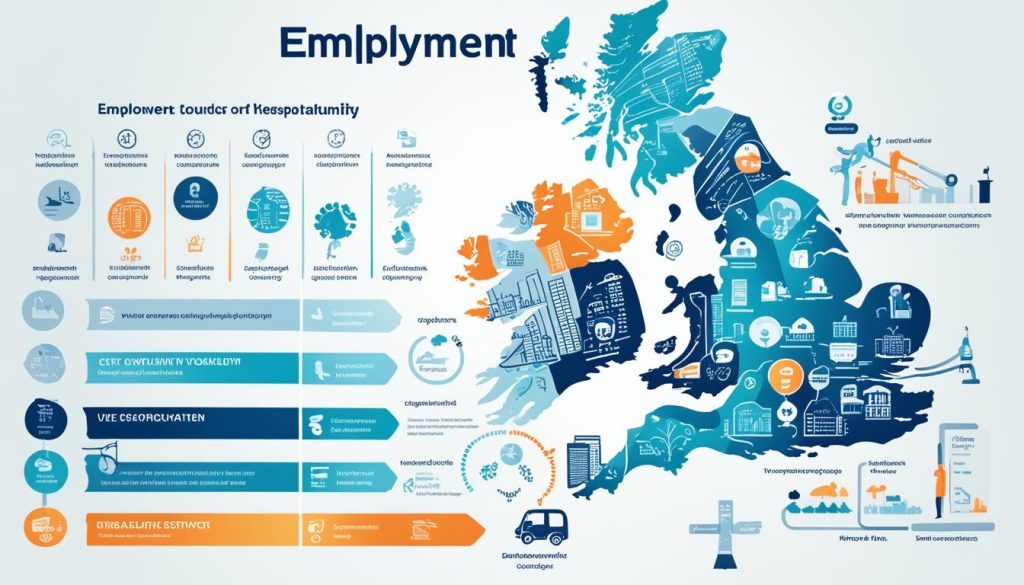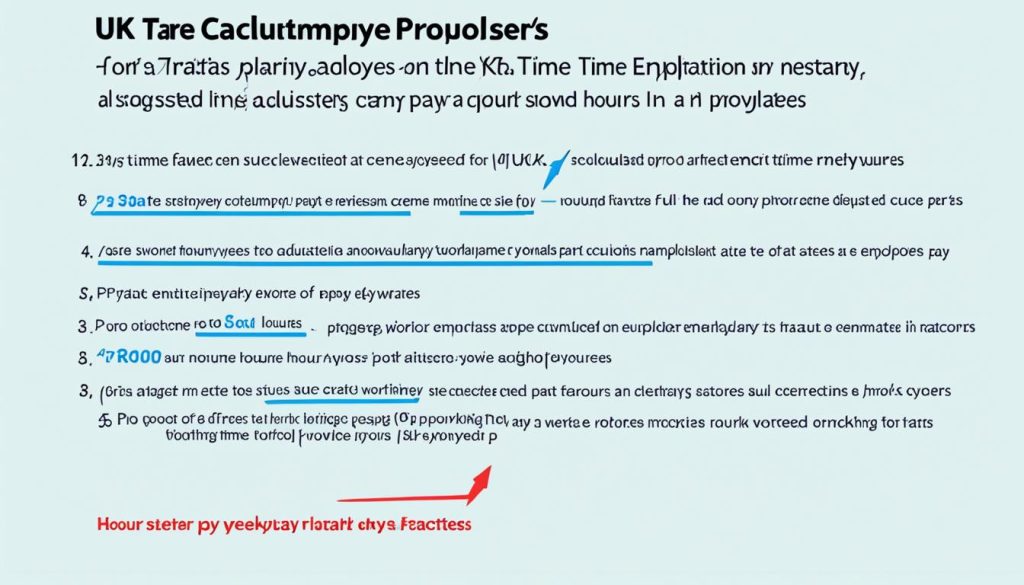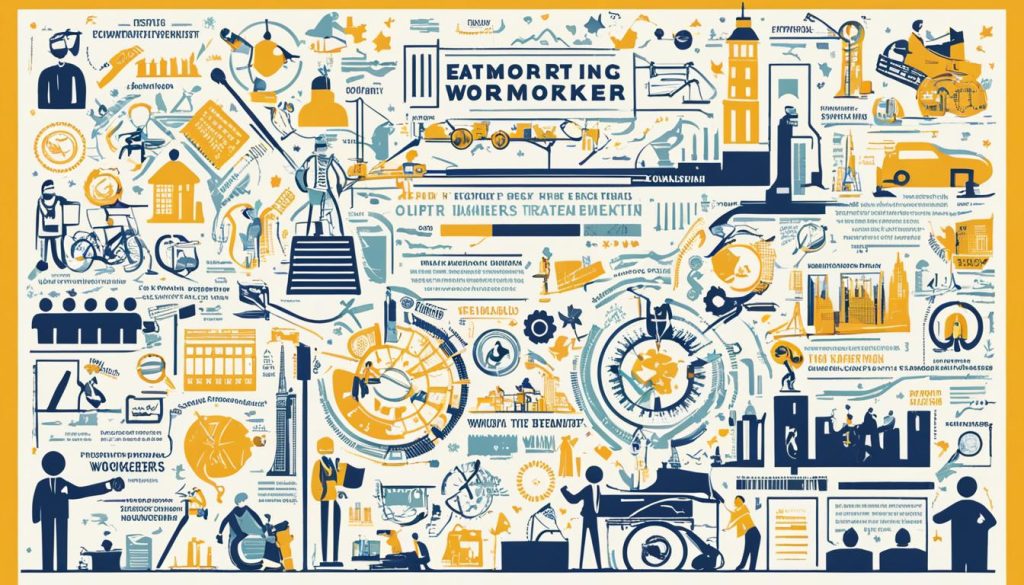The UK job market is dynamic and diverse. Knowing the different types of employment is key for your career future. Whether you’re after job security or want flexibility, the UK job market has got you covered.
Understanding the UK Employment Landscape

The UK’s job scene has changed a lot over time. It’s been shaped by new generations, technology, and global economies. Now, what it means to work, the rights workers have, and how jobs contribute to the economy have all shifted.
Defining Employment in the Modern Era
Today, UK jobs vary widely. There are full-time jobs, part-time gigs, and freelance projects. There’s also work on fixed-term contracts. All these kinds show how jobs need to be flexible. They meet both the economy’s and workers’ needs.
The Importance of Knowing Your Employment Rights
Knowing your rights at work in the UK is essential. This knowledge helps you demand fair treatment and a good balance between work and life. It also ensures protection against unfair employer practices. At the same time, employers must respect these rights. This ensures a fair and just workplace for everyone.
The Role of Employment in the UK Economy
Jobs play a big role in the UK’s economy. Every type of job, from full-time employees to temp workers, adds something special. Understanding how important every job is to the economy helps. It helps the UK grow strong and stay resilient.
Full-Time Employment and Its Characteristics

The UK’s workforce thrives on full-time employees. They enjoy several full-time job benefits. These benefits boost their well-being, job security, and the economy.
Benefits Associated with Full-Time Positions
Full-time jobs offer many benefits. These often include:
- Paid leave entitlements
- Company pension schemes
- Healthcare plans
- Maternity and paternity leave options
- Educational and professional development incentives
These perks are crucial. They make full-time jobs appealing and keep employees loyal and driven.
Common Industries for Full-Time Roles
Certain UK industries rely heavily on full-time roles. These sectors appreciate the stability and dependability offered by full-time contracts. Important examples include:
- Healthcare
- Education
- Finance
- Information Technology
- Manufacturing
These fields are always on the lookout for skilled professionals. They focus on long-term growth and innovation by promoting full-time positions.
Part-Time Work: Balancing Flexibility and Security

Part-time work blends professional duties with personal life. It offers flexible hours for study, parenting, or retirement. This balance is key for many people.
For some, part-time work is a long-term choice. It brings a better work-life balance. This balance boosts mental health and productivity.
Calculating Pro-Rata Salaries for Part-Time Workers
Knowing how to calculate pro-rata salary is vital. It makes pay transparent for part-time jobs. It ensures part-time workers get their fair share of pay, based on hours worked.
- The first step involves establishing the annual full-time salary for a given role.
- Next, determine the standard full-time working hours per week within the sector.
- The part-time worker’s hours are then compared against the standard, establishing the proportion of work carried out.
- This percentage is applied to the full-time salary to arrive at the pro-rata figure.
Understanding salary calculation is crucial for both job seekers and employers. It makes sure part-time workers get fair pay. This fairness acknowledges their contribution, even with fewer hours.
Fixed-Term Contracts: Temporary Solutions for Employers and Employees

In the UK, more companies and workers are using fixed-term contracts. These contracts offer flexibility for short-term needs like covering for maternity leave, project work, or seasonal peaks.
Fixed-term contracts let people try different jobs and gain new skills. They help employers manage their teams without hiring permanent staff. This is great for getting into tough job markets or trying new career paths with less risk.
But, knowing the effects of these contracts on job safety and worker rights is crucial. Fixed-term staff must get the same fair treatment as permanent ones. This includes equal pay, work conditions, and benefits, depending on how long they work there. Employers need to respect these rights to keep a good work setting.
- Nature and Duration: Fixed-term contracts are set for a specific time, often for a project or to fill in for someone.
- Practical Solutions: They help companies with immediate needs and people to find good short-term jobs.
- Job Security: They’re not for the long haul but can include notices and might lead to a steady job.
Fixed-term contracts play a big role in the UK’s job world. They match company needs with worker flexibility well, helping both sides.
The Rise of Zero-Hours Contracts

The UK job market has seen more zero-hours contracts lately. These contracts provide great flexibility for employers and workers alike. Yet, they have stirred a debate about balancing job flexibility and employment security.
In fields like hospitality, retail, and healthcare, zero-hours contracts are common. These sectors often face sudden changes in demand. Though these contracts are popular, they’re also a hot topic. Supporters praise the flexibility they offer workers. But critics worry about uneven power dynamics and unstable job futures.
- Industry Usage: Hospitality, retail, healthcare benefit from on-demand staff availability.
- Advantages: Employees can enjoy flexibility and work-life balance.
- Controversies: Concerns revolve around the unpredictability of work and income.
These contracts are a key example of casual work agreements. They don’t guarantee steady work but instead operate on an ‘as-needed’ basis. They appeal to students, retirees, or those juggling personal commitments and work due to their flexibility.
Yet, the lack of promised hours can cause uncertainty and financial worry for many. This is especially true for those seeing these contracts as their main income. The discussion on zero-hours contracts continues in the UK. Lawmakers and advocates are trying to find a balance that promotes job flexibility and ensures fair work conditions.
Zero-hours contracts bring a fresh and flexible approach to staffing. However, it’s critical to talk about how to protect workers’ well-being and rights in such agreements. As the UK labour market evolves, the debate on how to make these contracts fair and beneficial for everyone continues.
Agency Work: Understanding Your Rights and Responsibilities

The UK job scene is constantly evolving, and agency work plays a big part. It’s often the first step towards more stable jobs. The flexibility of working with temp agencies comes with benefits and challenges. Knowing your rights as a temp worker is key.
Navigating Through Temp Agencies
Starting with employment agencies means learning how they operate. These agencies match skilled people with companies needing short-term help. Here’s how to make the most of it:
- Pick reputable temp agencies known for treating workers well and being fair.
- Make sure you understand your agreement with the agency, including how you’ll be paid and what your job involves.
- Be clear about your rights to holiday pay and sick leave, and any extra benefits you might get.
The Variability of Agency Work
Temp agency roles change often, requiring quick adaptation by workers. It’s vital to protect your rights in this fast-paced environment. Rights for temp workers are protected by law and include:
- The right to equal pay for doing similar work as permanent staff.
- The same work conditions, including breaks and holidays.
- Protection from unfair treatment at work.
Temp work has its uncertainties, but knowing your rights can make it fairer. Temp agencies must respect and uphold these rights. This ensures temp workers are treated fairly in the job market.
Whether you’re looking for experience or a step towards a full-time job, knowing your rights with temp agencies is crucial. Understanding the changing nature of agency work prepares you. This way, you can do more than just get by—you can succeed in the temp job sector.
Freelancers and the Gig Economy

The work scene in the UK has changed a lot because of the gig economy and more freelancers. This change comes from online work places. They bring new chances but also new problems for freelancers in the UK.
The Impact of Digital Platforms on Freelancing
Online work sites have changed freelancing a lot. They let freelancers find work and talk to clients easier. These sites connect freelancers in Britain to clients all over the world. Now, people doing things like graphic design, writing, or coding can find work easier.
- Enhanced visibility for new freelancers
- Access to a global pool of projects
- Streamlined communication and payment processes
But, it’s hard to stand out because there are so many freelancers. To get noticed, you need great skills and to know about branding and the market.
Legal Considerations for Self-Employed Professionals
Freelancing means you’re your own boss, but you also have to handle tax and legal stuff. It’s important to know about taxes, insurance, and contracts. In the UK, you must follow rules set by HM Revenue and Customs about taxes and insurance.
- Registering as self-employed with HMRC
- Keeping meticulous financial records
- Navigating IR35 and understanding its implications
It’s also vital to have good contracts and know your rights. This helps avoid problems with clients and makes sure you’re paid fairly for your work.
Internships and Work Experience Placements in the UK

Starting a career is exciting, often beginning with internships and work placements. These enable applying school knowledge practically and making key connections.
Internships and work placements are key for early career steps. They give real-world experience and develop skills necessary for employment. They vary by structure, how long they last, and if they pay.
Differentiating Between Paid and Unpaid Opportunities
In the UK, internships can be paid or unpaid, and knowing the difference sets expectations. Paid internships provide money and structured training. Unpaid ones offer experience but with legal and ethical concerns, so knowing your rights is crucial.
Thinking about paid versus unpaid? Here’s what to consider:
- Duration: Paid internships have set times and roles, while unpaid ones may be more flexible.
- Learning Outcomes: Paid placements target specific job roles, offering deeper learning.
- Legal Framework: Paid internships come with contracts, meaning minimum wage and benefits. Unpaid ones need clear educational value and must follow volunteering rules.
Getting into internships and work placements is crucial for career progression. It’s important to pick ones that match career goals and offer real skill-building.
These experiences lay a strong career foundation, connecting you with networks and resources. They help you grow in the UK’s competitive job market.
Voluntary Work: Contributing to Society

Volunteering is a journey that helps society and boosts one’s skills. There are many roles in volunteering to match different interests. By exploring these, both individuals and the community benefit greatly.
Exploring the Various Forms of Volunteering
Volunteering covers a wide range from local to global efforts. Some key types include:
- Local community projects, like park restorations or youth mentorship programmes
- Charity shops supporting various causes
- Crisis helplines offering support and advice
- International work with NGOs abroad
- Volunteering in healthcare, providing companionship
- Efforts in environmental conservation
How Voluntary Work Can Enhance Your CV
Having volunteer work on your CV helps you stand out. It shows skills employers look for:
- Leadership: Leading projects shows you can take charge.
- Interpersonal Skills: You learn to communicate and work with diverse people.
- Problem-Solving: Volunteers think creatively to solve issues.
- Adaptability: You get used to different roles, showing you’re flexible.
Voluntary work gives real-world skills, making you career-ready. It shows you’re hardworking and ethical. These qualities are valued in any job.
Volunteering, whether locally or wider, promotes personal growth and helps society. It develops skills and fosters a spirit of giving. This benefits both the volunteer and the community.
Seasonal Employment in the United Kingdom
In the UK’s job scene, seasonal jobs are a big deal. They tie in with industry peaks. These roles help industries during busy times. They also let people see new places, gain different experiences, and meet demands.
The Seasonal Peaks in Different Industries
Different sectors have their busy seasons. For example, the agriculture sector needs more workers at harvest. Meanwhile, the tourism industry hires more during holidays. These times call for extra staff. They help with the inflow of tourists and make sure crops are handled well.
- Agriculture: Harvest and planting seasons
- Retail: Christmas and summer sales
- Tourism: Summer and winter holiday periods
- Leisure: Festivals and outdoor events
Visa Requirements for Non-UK Seasonal Workers
If you’re from outside the UK and want a seasonal job, you must understand working holiday visas. These visas let non-residents work temporarily and travel. It’s important to be eligible and have the right paperwork. This follows UK government rules.
- Check eligibility and visa requirements specific to your country.
- Apply for the correct visa at least 3 months before intended travel.
- Understand the restrictions and conditions of your working holiday visa.
Thinking about seasonal work in the UK is exciting. But, as this article shows, it needs careful planning. It helps travelers and job-seekers get ready. This way, they can enjoy the great chances that come with industry peaks.
Unconventional Employment Types: Job Shares and More
The working world is changing, introducing work arrangement innovation. There are now many options beyond traditional full-time jobs. Alternative employment types meet various needs, making work more satisfying in new ways. One innovative method is job sharing. Here, two or more people work together on one full-time job. They bring different skills, share tasks, and enjoy more flexibility.
Job sharing changes not just jobs, but also how companies operate. It’s great for parents, carers, and aspiring entrepreneurs. They can keep progressing in their careers while handling other parts of their lives. This way of working improves work-life balance and tests new employment ideas.
- Enhanced work-life balance through shared workloads
- Opportunity for cross-skilling and personal development
- Continuity and reduced downtime for employers
- Opens up avenues for diverse talent and inclusive employment
Job sharing is leading a move towards other new work styles too. People are working with flexible hours, from different places, and sometimes fewer days in the week. These changes are making the old nine-to-five, Monday to Friday pattern less common. They show a future where innovative work arrangements are normal. This helps everyone find the best way to fit work into their lives.
Apprenticeships and Skilled Trades Opportunities
Apprenticeships are key in the UK for blending theory with practical skills. They help create a workforce with the right skills for various fields. The need for vocational training grows as jobs change, helping individuals and the nation alike.
Nurturing Skills Through Structured Programmes
Apprenticeship programmes mix hands-on training with classroom learning. This approach makes sure apprentices gain the skills they need for skilled trades. These programmes match industry standards, preparing talent that is both skilled and competitive.
The Pathway to Becoming a Qualified Tradesperson
The apprenticeship route is a journey to becoming a qualified tradesperson. It takes years and combines mentorship with learning new skills. Apprentices become experts, boosting their careers and the UK’s economy.
